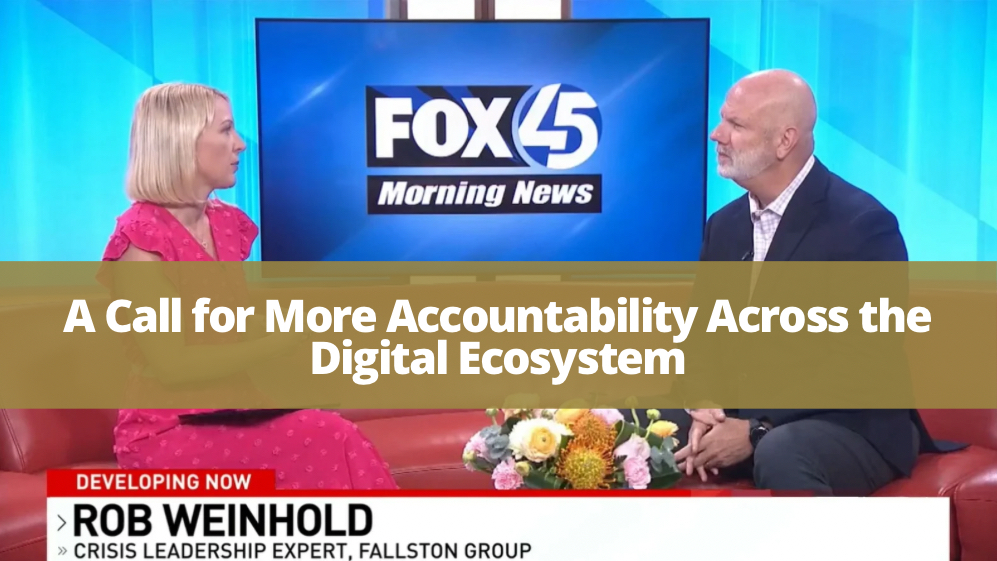The Real-World Cost of Digital Recklessness: A Call for Accountability

In today’s hyperconnected and always-on digital world, the viral spread of misinformation can rapidly and irrevocably damage lives. At Fallston Group, we’ve spent decades advising organizations and individuals during their most critical moments—and if one truth has become abundantly clear, it’s this: digital recklessness has very real, often life-altering consequences. The recent situation involving Mary Kate Cornett, a college freshman at the University of Mississippi, underscores the urgent need for greater accountability across our digital ecosystem. Based on publicly available reports, Ms. Cornett—by all accounts,a promising first-year business student—found herself at the center of a viral firestorm after an anonymous and unverified post was made on the YikYak platform on February 25th. What began as a baseless rumor quickly spiraled across platforms like X (formerly Twitter), drawing the attention of high-profile commentators and online audiences. Her name and likeness were circulated widely without her consent, often without credible facts. While those spreading the story may have viewed it as a moment of entertainment or gossip, the human cost to Ms. Cornett was significant and deeply personal. This moment is not about adjudicating guilt or intent—it’s about acknowledging a broader systemic and human failure. It’s a cautionary tale for institutions, influencers, and individuals alike. And it’s one of many such stories in a time when reputations can be compromised with a single click. Five Critical Crisis Leadership Observations 1. Real People, Real Pain Behind every viral moment is a real person. In this case, a young woman’s formative college experience has reportedly been upended by an untrue narrative. Reputational harm doesn’t just affect public figures—it affects students, professionals, and everyday citizens whose lives are impacted by reckless digital behavior. 2. Platforms Must Act—Swiftly and Transparently Social media companies must continue to evolve their moderation and response capabilities to address harmful content in real time. Whether it’s anonymous platforms or large-scale social networks, delayed action contributes to widespread harm. 3. Content Amplifiers Must Use Their Platforms Responsibly While sports media and digital commentary platforms play an important role in modern discourse, the line between free speech and reputational harm must be navigated with care. Those with influence must be thoughtful and discerning—particularly when discussing unverified claims involving private individuals. 4. Accountability Must Be a Shared Priority Whether through corporate governance, advertiser pressure, or public expectations, digital amplifiers must be held to higher standards. The systems that allow misinformation to thrive must be reviewed, reformed, and enforced through responsible action. 5. Digital Education Is a Survival Skill Colleges, universities, and families have a growing responsibility to educate young people about the risks of digital exposure. Media literacy, digital resilience, and reputation defense must be integrated into the student experience. These aren’t “nice-to-haves”—they’re essentials in today’s reputational landscape. At Fallston Group, we often remind our clients that reputation leads to trust, and trust leads to valuation—and not all currency is financial. In fact, in many cases, reputational currency is what opens doors, secures relationships, and sustains opportunity. To those affected by the irresponsible spread of misinformation: you are not alone. And to those with a microphone or platform—whether digital or traditional—remember that your influence is a responsibility, not a right. If you are an academic center of excellence—particularly within higher education—and wish to ensure your students and stakeholders are properly educated and protected in today’s fast-paced, high-stakes media environment, contact Fallston Group. Our crisis leadership experts can help you develop proactive training, reputational safeguards, and crisis response protocols tailored to your institution. The stakes are too high to wait. All of us must be ready to meet the moment.
